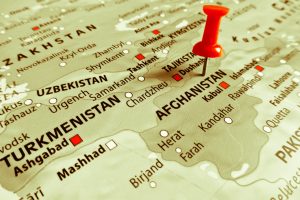“Every refugee is a symptom of our collective failure to ensure peace and security,” Filippo Grandi, the U.N. High Commissioner for Refugees, wrote recently in the Guardian. This often-overlooked fact underpins the plight of 114 million people who have been displaced across the world. Of this total, there are 36.4 million refugees scattered worldwide.
Although the world’s displaced population shares many common needs and challenges, not all of them receive adequate attention and aid from the international community. This is usually determined by whether certain major powers are directly or indirectly involved in the conflicts that bring about internal displacement and the flight of others across international borders.
Sadly, for example, conflicts in Africa are considered “protracted and forgotten,” demonstrating a lack of interest on the part of major powers to provide the necessary level of assistance to the region’s displaced populations. Intergovernmental aid agencies, such as the United Nations High Commissioner for Refugees (UNHCR), have historically depended on contributions from the wealthy member-states of the United Nations, whose degree of support determines the amount of aid provided to displaced populations, including refugees.
Since the 1980s, Afghanistan has had one of the world’s largest displaced populations. The first wave of Afghan refugees was triggered by the ideological battles of the Cold War. During this period, Afghan refugees received notable attention and international support. When the Cold War ended, however, Afghanistan and the plight of its refugees fell off the international aid radar. This dynamic changed again in the wake of 9/11 when the United States intervened in Afghanistan, supporting the country’s stabilization and development, including the return and reintegration of Afghan refugees.
Despite greater international support between 2001-2021, most Afghan refugees in neighboring countries remained reluctant to return home, while many others, especially the youth, fled Afghanistan to find a more secure future in developing and developed countries. The months before the fall of the Islamic Republic in August 2021 and since have seen a massive new exodus of young Afghan families, fleeing the escalating war, well-founded fears of persecution, targeted killings, enforced disappearances, as well as shrinking socioeconomic facilities and opportunities under the oppressive regime of the Taliban.
Some 3.5 million Afghans have been internally displaced so far. This is the world’s second largest internally displaced population, which includes about 1 million Afghans who were displaced by the deadly offensives and attacks that the Taliban and their affiliates jointly carried out throughout 2021 before the fall of Kabul. Besides this, some 2.3 million Afghans have been driven across Afghanistan’s borders and live as refugees in 98 different countries.
Of this large displaced population, few internally displaced persons (IDPs) and refugees have received any meaningful assistance over the past three years. The only exception is a handful of Afghans, former employees of NATO in Afghanistan before 2021, who have been evacuated and resettled in a number of developed countries. Although international aid has significantly declined given a shift in U.S. Afghanistan policy after 2021, Afghans still count on vital initiatives such as the Global Refugee Forum (GRF) for increased international aid and sustainable solutions.
Launched four years ago, the GRF convenes this year in Geneva from December 12-15, bringing together multi-sectoral international stakeholders to meet and support durable solutions to the plight of world refugees and internally displaced persons (IDPs). Participants include states, the private sector, international financial institutions, U.N. agencies, humanitarian and development organizations, cities and local authorities, NGOs, refugee-led organizations, faith groups, and others. The diversity of the participants and the resources that they will collectively bring to bear on addressing the challenges confronting the world’s displaced population is quite encouraging.
For the GRF to help address the problems of Afghan refugees on a sustainable basis, participants should consider a two-pronged approach. Foremost, the absence of an inclusive Afghan government with internal legitimacy and external recognition remains the root-cause of Afghans’ continued migration. GRF participants, including states with a stake in sustainable peace in Afghanistan, should reaffirm their commitment to and mobilize the necessary resources for helping all Afghan sides, including the Taliban, to form a representative government as a durable solution to most of Afghanistan’s growing problems, including its refugee crisis.
Second, while results-driven work is done on the political solution to the Afghan refugee problem, UNHCR and its implementing partners must be adequately resourced to address the various challenges facing Afghanistan’s displaced communities at home, in neighboring countries, and across the world. Inside the country, priority must be given to relief and recovery support to the Afghan IDP population, while adequate reintegration assistance should be provided to Afghan refugees forcibly deported by Pakistan and Iran.
In the said neighboring countries, global aid should focus on the education and technical skills development needs of Afghan refugees, preparing them for local employment, resettlement in a third country, or voluntary repatriation when Afghanistan has stabilized on a sustainable basis. Providing indirect support through host countries has borne little results, since corruption, discrimination, and related bureaucratic issues prevent aid from reaching the targeted beneficiaries. Finally, in the developed countries, assistance should focus on provision of psycho-social services, language lessons, job training, and job placement, effectively enabling the newly resettled Afghans to begin their journey of integration into their new societies.
Almost 2,500 years ago, the Greek dramatist Euripides wrote, “There is no greater sorrow on Earth than the loss of one’s native land.” For Afghans, too, the tragedy of losing their beautiful homeland to the imposed conflicts of the past four decades is no less tolerable. In the coming days, they count on the GRF participants to reverse this tragic experience by helping restore sustainable peace in Afghanistan as the only durable solution to the plight of its refugees.

































